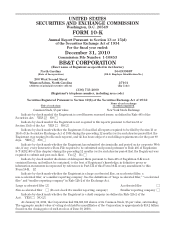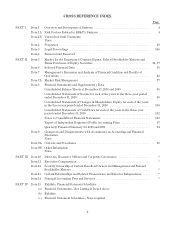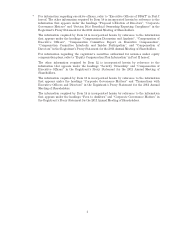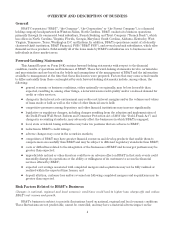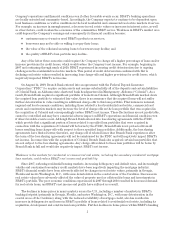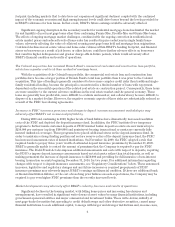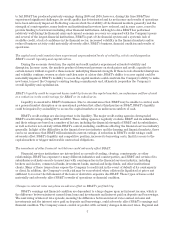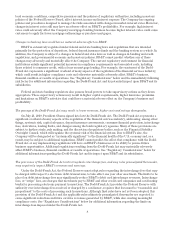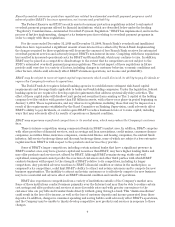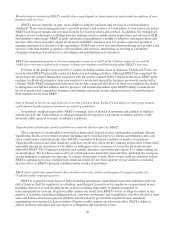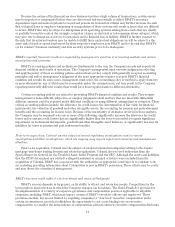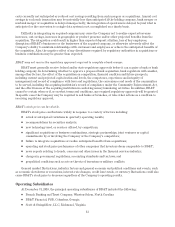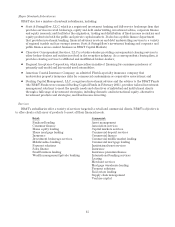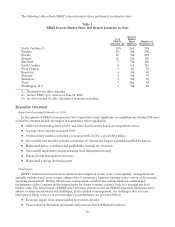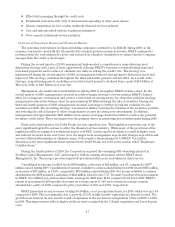BB&T 2010 Annual Report Download - page 8
Download and view the complete annual report
Please find page 8 of the 2010 BB&T annual report below. You can navigate through the pages in the report by either clicking on the pages listed below, or by using the keyword search tool below to find specific information within the annual report.local economic conditions, competitive pressures and the policies of regulatory authorities, including monetary
policies of the Federal Reserve Board, affect interest income and interest expense. The Company has ongoing
policies and procedures designed to manage the risks associated with changes in market interest rates. However,
changes in interest rates still may have an adverse effect on BB&T’s profitability. For example, high interest
rates could adversely affect the Company’s mortgage banking business because higher interest rates could cause
customers to apply for fewer mortgage refinancings or purchase mortgages.
Changes in banking laws could have a material adverse effect on BB&T.
BB&T is extensively regulated under federal and state banking laws and regulations that are intended
primarily for the protection of depositors, federal deposit insurance funds and the banking system as a whole. In
addition, the Company is subject to changes in federal and state laws as well as changes in banking and credit
regulations, and governmental economic and monetary policies. BB&T cannot predict whether any of these
changes may adversely and materially affect the Company. The current regulatory environment for financial
institutions entails significant potential increases in compliance requirements and associated costs, including
those related to consumer credit, with a focus on mortgage lending. For example, the enactment of the Dodd-
Frank Act represents a significant overhaul of many aspects of the regulation of the financial services industry,
which could result in higher compliance costs and otherwise materially adversely affect BB&T’s business,
financial condition or results of operations. See “Regulatory Considerations” below and the immediately following
risk factor for additional information regarding the Dodd-Frank Act and its potential impact upon BB&T and its
subsidiaries.
Federal and state banking regulators also possess broad powers to take supervisory actions as they deem
appropriate. These supervisory actions may result in higher capital requirements, higher insurance premiums
and limitations on BB&T’s activities that could have a material adverse effect on the Company’s business and
profitability.
The passage of the Dodd-Frank Act may result in lower revenues, higher costs and ratings downgrades.
On July 21, 2010, President Obama signed into law the Dodd-Frank Act. The Dodd-Frank Act represents a
significant overhaul of many aspects of the regulation of the financial services industry, addressing, among other
things, systemic risk, capital adequacy, deposit insurance assessments, consumer financial protection, interchange
fees, derivatives, lending limits, and changes among the bank regulatory agencies. Many of these provisions are
subject to further study, rule making, and the discretion of regulatory bodies, such as the Financial Stability
Oversight Council, which will regulate the systemic risk of the financial system. Due to BB&T’s size, the
Company will be designated as “systemically significant” to the financial health of the U.S. economy and, as a
result, may be subject to additional regulations. BB&T cannot predict the effect that compliance with the Dodd-
Frank Act or any implementing regulations will have on BB&T’s businesses or its ability to pursue future
business opportunities. Additional regulations resulting from the Dodd-Frank Act may materially adversely
affect BB&T’s business, financial condition or results of operations. See “Regulatory Considerations” below for
additional information regarding the Dodd-Frank Act and its impact upon BB&T and its subsidiaries.
The provisions of the Dodd Frank Act restricting bank interchange fees, and any rules promulgated thereunder,
may negatively impact BB&T’s revenues and earnings.
Under the Dodd-Frank Act, the Federal Reserve must adopt rules regarding the interchange fees that may
be charged with respect to electronic debit transactions, to take effect one year after enactment. The limits to be
placed on debit interchange fees may significantly reduce BB&T’s debit card interchange revenues. Interchange
fees, or “swipe” fees, are charges that merchants pay to BB&T and other credit card companies and card-issuing
banks for processing electronic payment transactions. The Dodd-Frank Act provides the Federal Reserve with
authority over interchange fees received or charged by a card issuer, requires that fees must be “reasonable and
proportional” to the costs of processing such transactions. Although final rules have not yet been adopted, this
provision of the Dodd-Frank Act and the applicable rules ultimately promulgated thereunder are expected to
cause significant reductions in future card-fee revenues generated by BB&T, while also creating meaningful
compliance costs. See “Regulatory Considerations” below for additional information regarding the limits on
interchange fees imposed under the Dodd-Frank Act.
8

